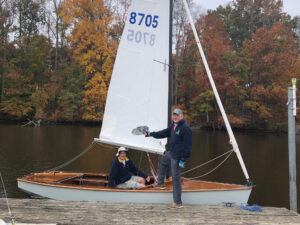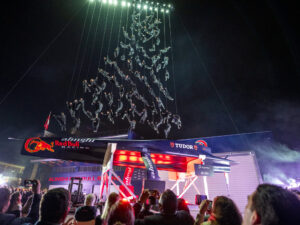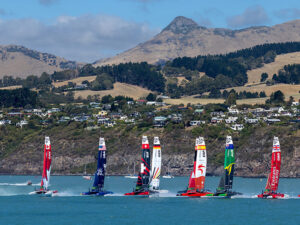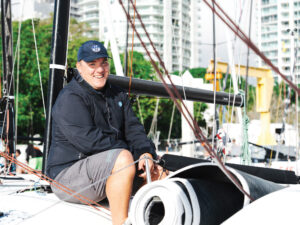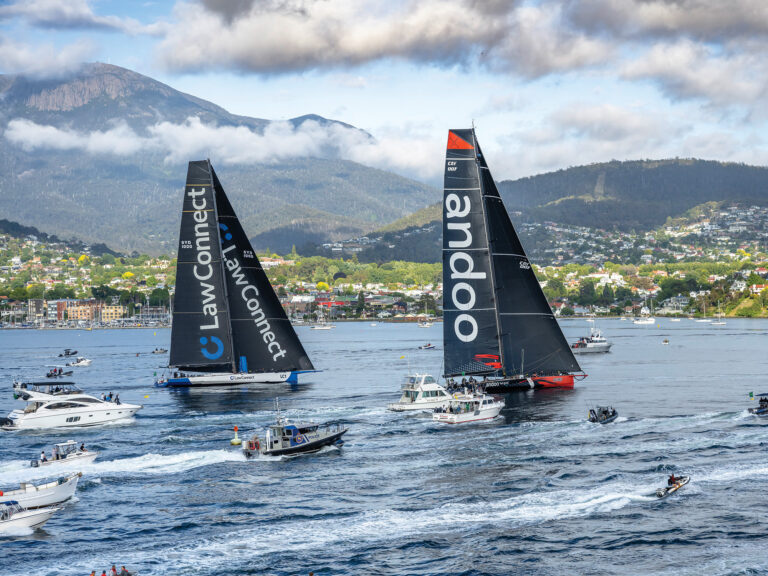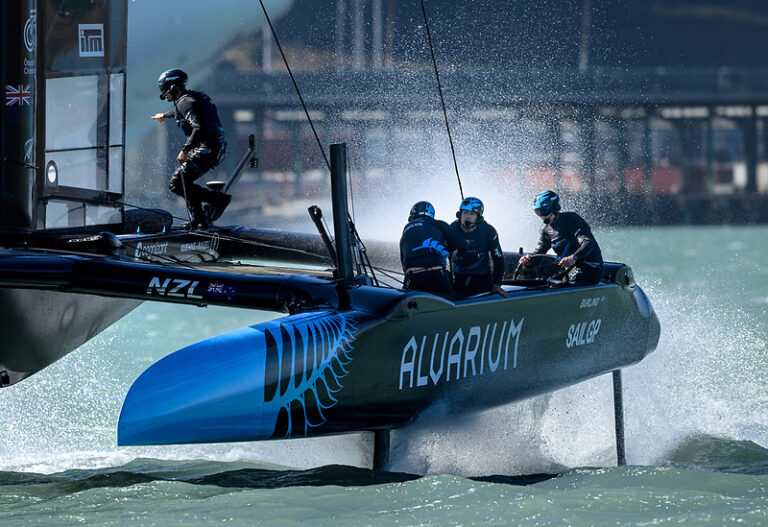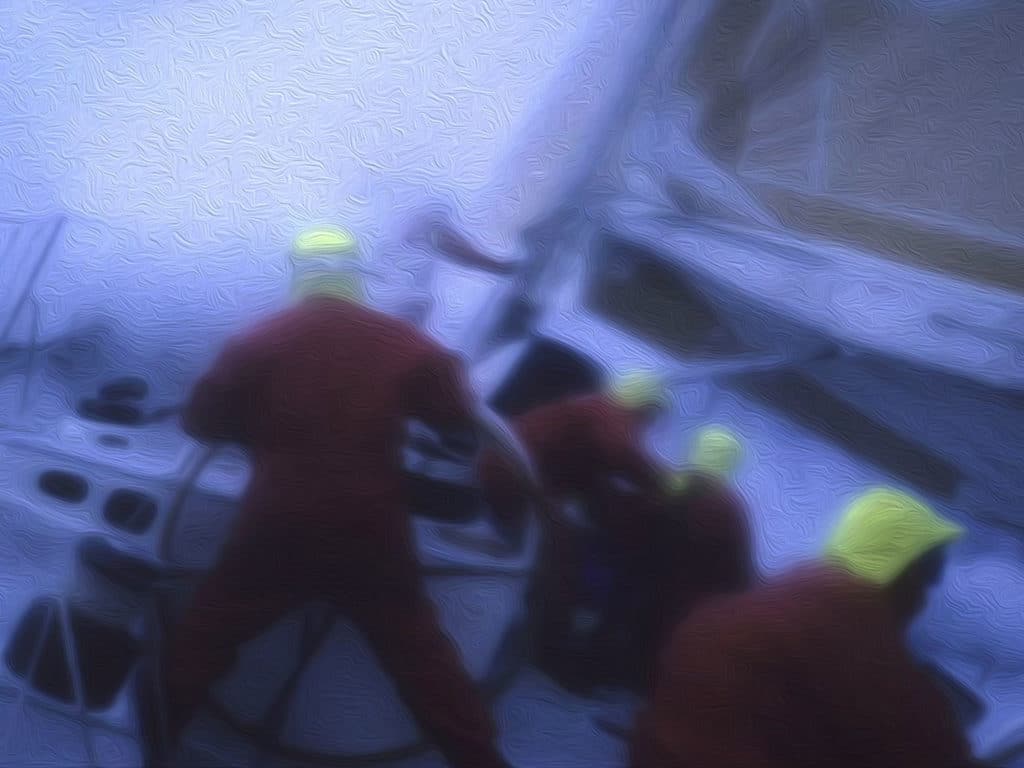
An excerpt from By Roger Vaughan’s novel “Coming About.”
The video re-ran several times a year in Andy’s dreams. It was always the same, down to the last detail, and it never failed to leave him with a hollow, perplexed feeling. If the conditions were right it could play in broad daylight, as it did this particular July afternoon, induced by the monotony of riding the rail of his father’s boat. Worthy, a competitive fifty-footer, was sailing upwind in a vacillating but strong flow of warm breeze, the hull rising and falling with a slow, roller-coaster rhythm through the big ground swells off Newport, Rhode Island. Such conditions provoked either seasickness or ennui. Andy and the rest of the crew were facing westward into a late-afternoon sun that had dropped out of the high overcast and was turning the water’s surface into a million sparkling, hypnotic diamonds. The soft, white-noise wash of water against the hull as the boat slid down the backsides of the broad swells helped bring on Andy’s reverie. His head drooped against the lifelines. His eyes closed.
It was ten years ago. Andy and his friend Robby were fourteen, goofing on their mountain bikes at the 57th Street entrance to Manhattan’s Central Park, waiting for Mitchell Thomas, Andy’s father. And there came the great man, on cue, promptly at six thirty p.m., dapper as hell on his spotless, dark-green Raleigh three-speed he’d special-ordered from England, the one with the enclosed metal chain guard, chromed brake rods, narrow fenders pinstriped in gold, and natty wicker basket. His Mark Cross briefcase with his Brooks Brothers suit jacket neatly folded on top were strapped to the rear carrier. His necktie bearing the burgee of the New York Yacht Club had been flipped over his shoulder by the headwind.
Every time he saw Mitchell this way Andy felt as if he were watching one of those TV commercials where a period person was presented in black and white against a contemporary scene in color. Not a hair on Mitchell’s head as much as fluttered in the breeze. Mitchell may as well have been a paid actor for all the paternal connection he inspired in Andy at these times.
Mitchell didn’t stop, didn’t speak, just nodded to the boys with his habitual, all-purpose executive grin, and rode into the park. The boys fell in behind him like dogs at heel. Robby peeled off at 72nd Street, heading for his family’s apartment on the East Side. Andy got distracted by irresistible, off-path opportunities, skidding through some soft new landscaping, jumping off a wall, and crashing through a hedge and nearly running over a couple entwined behind it until he heard Mitchell’s angry shout. He turned his bike sharply and quickly caught up to his father.
Mitchell seemed more upset than usual about Andy fooling around on his daily ride home. Something had to be bugging him. What a jerk, his father. How could this man even be his father? “Keep up,” Mitchell warned in that terse way of his. Keep up. Yeah, right. Hey Mr. Movie Guy on your stupid three-speed, you keep up! Andy pulled a wheelie and took off, leaving his father shouting after him. There would be hell to pay, but his mother would intervene, as usual. Even at fourteen, Andy understood that Mitchell didn’t dare mess with his mom. It was her company, her money. Andy would speed around the pedestrian tunnel up ahead and lie in wait for his father, give him a scare. The predator in the park.
Tucked behind a big tree, Andy waited. But Mitchell didn’t come out of the tunnel. Maybe he’d taken a different route? Not Mitchell. Andy thought he heard voices; it sounded like an argument but it was hard to be sure against the dull jungle roar of the city that invaded the park. Then he did hear someone yell. Twice. It was Mitchell’s voice, for sure, only he couldn’t make out the word. It did sound like one word, repeated. But the gunshot, amplified by the tunnel, was unmistakable. It sent a chill up Andy’s spine, momentarily freezing him to the big oak tree. Two guys emerged from the tunnel on the run, split up, and disappeared into the gathering dusk. Andy waited, fear constricting his chest. He jumped when a squirrel scampered away above him. It took all his will to leave the protection of the old oak, and not to pedal full speed toward the West Side and home. He coasted cautiously down the slight incline and into the tunnel.
Mitchell was on his knees in the semi-darkness, the precious Raleigh down at a bad angle beside him. He was clutching his right forearm. When he looked up, his face was drawn with pain and shock. When he saw Andy, the pain mixed with rage. Andy was fixed on the blood seeping between Mitchell’s fingers, slick and dark. Andy’s throat was dry. He felt sick.
Mitchell struggled to his feet, sputtering incoherently. Andy’s rising nausea combined with his fear to freeze him in place. His feet felt glued to the damp concrete of the tunnel floor. He watched his father struggle to regain his feet and stagger toward him, maniacal in his disarray, howling with force that spewed saliva. Andy felt it on his face. “You . . . bastard!” Mitchell screamed at him, the veins in his neck like ropes. The word was expelled with such power that it blew past Mitchell’s vocal chords as part screech. “You BASTARD!” Mitchell half turned away only to snap back, his left hand releasing the fresh wound just long enough to smack Andy on the side of his head with a savage growl and all the strength he could muster.
Still astride his bike, Andy went down, little points of light twinkling behind his eyes. He hadn’t seen the hand that felled him, he had been so intently focused on the blood-soaked shirtsleeve covering where the bullet had entered. Luckily for Andy, Mitchell’s wild swing had only partially connected, but it had left blood on his face. His father’s blood.
Even as he went down and before normal vision returned Andy was reflexively scrabbling away on hands and knees, dragging his bike, somehow getting it upright, running, jumping on one pedal and pushing hard, swinging into the saddle, bouncing once off the rough stone wall of the tunnel, pedaling with all he had along the familiar paths, his breath choked by sobs; hearing the crash, but never seeing the taxi that swerved into a parked car to miss him as he sprinted blindly out of the park onto Central Park West.
“Tacking.”
Mitchell’s voice brought Andy back with a start. The crewmen on either side of him chuckled. “Hey, jus’ grabbin’ a siesta,” one of them cracked as they jackknifed their legs in and scampered across the deck to the new high side as the boat changed tacks.
Andy had become a scruffy twenty-four-year-old. He was twenty pounds overweight with a habitually unkempt shock of thick dark hair. His clothes looked slept-in. He looked like a person with a habitual hangover. That was often the case. Mitchell’s crew was a spit-and-polish lot. They made the midshipmen aboard the Naval Academy boats look slightly tarnished. Andy would have stood out in any crowd. On this boat, he was a sore thumb.
Worthy was on the new tack for twenty minutes. But they were closing the layline, that imaginary path that would take them to the finish line on the other tack. Close also was Fetching, their main rival in this regatta. The two boats had been practically match racing all weekend. They’d split tacks as they’d entered the passage marked by Brenton Light. Fetching had chosen the east side, a move that would put it on starboard tack with right-of-way when they came together before the finish line. Whoever won that cross would take the race and the regatta. As Worthy tacked again, Andy heard the bowman announce that Fetching was also tacking.
Andy was the jib trimmer on the new tack. He took a third turn on the big winch drum and hauled hard and fast on the sheet. Given his slack look, his proficiency was surprising. “Trim,” he said quietly to the man on the coffee-grinder handles. “Stop.” Andy watched the jib, watched the speedo on the mast climbing quickly toward the optimum. “Three clicks, one more, stop.”
“Get it right,” Mitchell said from the wheel.
“It is.”
“It better be.”
Crewmen on the rail exchanged looks while Andy quietly simmered. Michell never stopped ragging Andy. The great Mitchell Thomas, hail fellow, captain of industry, excellent sailor. As the twentieth century drew to a close, he was one of the few amateurs who still steered his own boat and held his own in a fleet full of professionals. Good old Mitch. Good old son of a bitch was Andy’s version. Those who fawned over him should have to live just one day with him. They crewed for him for only one reason: he frequently won.
“Have we got them?”
Mitchell was addressing Andy, the only one on the lee side, the one with the best view of Fetching. The big genoa effectively blocked the view for the rest. For a moment, Mitchell silently cursed Rummans, his sailmaker and deck boss, for having assigned Andy to trim on the burdened port tack. Then he remembered. Jonesy, the regular port trimmer, had taken ill. Couldn’t make it. Better to have Andy there than some untested new guy. That was the theory anyway.
“No problem.”
“Get that weight outboard.” Mitchell addressed the crew in terse tones. “Let’s have it quiet.”
Intensity permeated the deck like heavy oil. There was no chatter from the railbirds. The mains’l trimmer’s eyes flicked from sail to instruments to sail. He took one click on the traveler, pulling the boom to windward maybe an inch. In the lulls, Andy eased the jib sheet an inch, called for a click or two of trim in the puffs.
“How we doing?” Mitchell stood erect, his face locked in concentration.
Andy said, “No problem.”
Sitting furthest forward on the rail, the bowman stretched himself forward to grab a quick look through the clear plastic window sewn into the genoa. “Close,” he muttered to no one in particular.
Andy heard him. “No problem.”
“By how much?” Mitchell demanded.
“Enough.”
Conley, the tactician, interrupted the edgy father–son exchange. “Are we good? If not we’ll tack early, lee-bow them, hope to give them some bad air, maybe pick up a header we can tack on. Better to cross them and then tack, pin them outside until we can lay the finish line.”
“We’re good.” Andy sounded confident.
Head down, the bowman stared into the bow wave under his feet, shook his head, started to speak, then decided to stay out of it. But he could feel it coming. It wouldn’t be the first time Andy and the old man had gotten it on.
“Starboard!”
The warning hail came from Fetching. The right-of-way boat always made a fuss trying to rattle the confidence of the crew hoping to cross. Making a close cross from the burdened position took a lot of cool, a lot of guts, and a keen eye. It was like running a stop sign when you knew a car was coming. The helmsman had to steer perfectly under pressure, maintaining the optimum combination of boat speed and heading. Large sailboats didn’t travel very fast, but they carried great momentum. Boats the size of Worthy and Fetching, with a combined weight of around 80,000 pounds, would be coming together at a closing speed of roughly twenty knots (twenty-three miles per hour). That was like two lightly loaded eighteen-wheelers colliding head-on when each was moving faster than ten miles an hour. Boats had no brakes. And the water they were moving through was an unstable platform. Misjudge a close cross, and the havoc of a collision was a good possibility. Damage could be extensive. The mast could come down. There could be serious injuries. The person making the call had to be very good, very confident in himself and in his helmsman. And vice versa.
A few moments passed. The only sounds were the slice of the cutwater and the eddies of water separating from the polished hull with a steady fizz.
“Starboard!” The hail was closer. This time there was more than a touch of frenzy in the call. And there were other voices chiming in, a sure sign that anxiety was becoming a factor aboard Fetching.
“Better tack!” Worthy’s bowman found his voice.
“Starboard! Hey! Starboardgoddammit! . . . STARBOARD . . . HEY!!”
Andy: “Tack, Mitchell. Tack! Tack now!”
“Don’t you tell me . . . Christ! . . . Tacking!” Cursing a blue streak, Mitchell Thomas drove the wheel down hard as he caught sight of Fetching coming into his path like a train, spinning Worthy on a dime to avoid the impending collision. The violent turn drastically reduced the boat’s forward motion. The crew sensed the crisis coming, and still used up valuable seconds getting off the rail and scrambling up the deck that was now tilted against them. Andy had to let the jib sheet run before the new trimmer was ready. It took precious seconds to overhaul the loose sheet and get the big jib in on the new tack. Worthy had avoided a collision, but it was a racing disaster.
Fetching passed by very close at full tilt, the wash of the hull frighteningly loud. Fetching’s skipper, Alistair Koonce, took a certain amount of pleasure cutting it as close as he dared, but he smartly eased his helm toward the wind five degrees to make sure he avoided Worthy, and so his mast would straighten up a bit and avoid slamming into Worthy’s now nearly upright rig. The sailors on both boats avoided one another’s eyes. No one on either boat said a word, except the outraged Mitchell Thomas, who kept up a vicious string of abuse directed at Andy, whose face remained impassive.
Koonce, a savvy New Zealand professional at the top of his game, let the hint of a smile cross his lips at the stream of invective coming from Worthy.
“Sounds like someone’s upset,” he said quietly. His crew, wound tight from the near miss, convulsed with laughter.
Koonce tacked for the finish line. With Worthy now tucked four boat-lengths behind them, and the finish less than a mile ahead, the race was over. Koonce and crew were winners, but they tended to business, watched the trim, tidied up lines and got ready to cross the line in style. Koonce gave the wheel to Rufus Samuels, the owner. Judd, Fetching’s tactician, a regular with Koonce, shook his head as Koonce sat down beside him.
“Why’s he do it? Why’s he take the kid? Why’s the kid go?”
Koonce shrugged. The race was history. He was already thinking about a beer, and other business.
“I know Deedee, Mrs. Thomas, Deedee Moss,” Rufus Samuels offered from behind the wheel. “She likes it that Andy sails on the boat. She insists, in fact. And since she is the majority stockholder in the company, well, let’s just say Mitchell has always been a realist.” Samuels paused. He chuckled, happily patted the wheel. “Our good luck. I thought they might have crossed us back there.”

